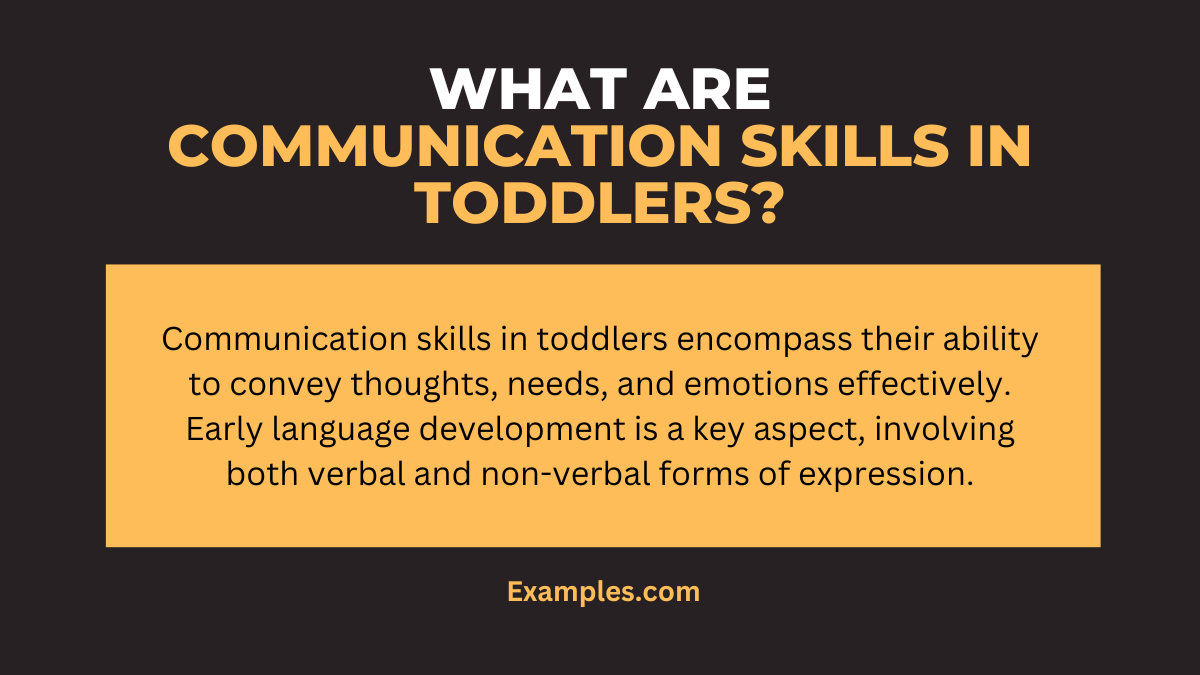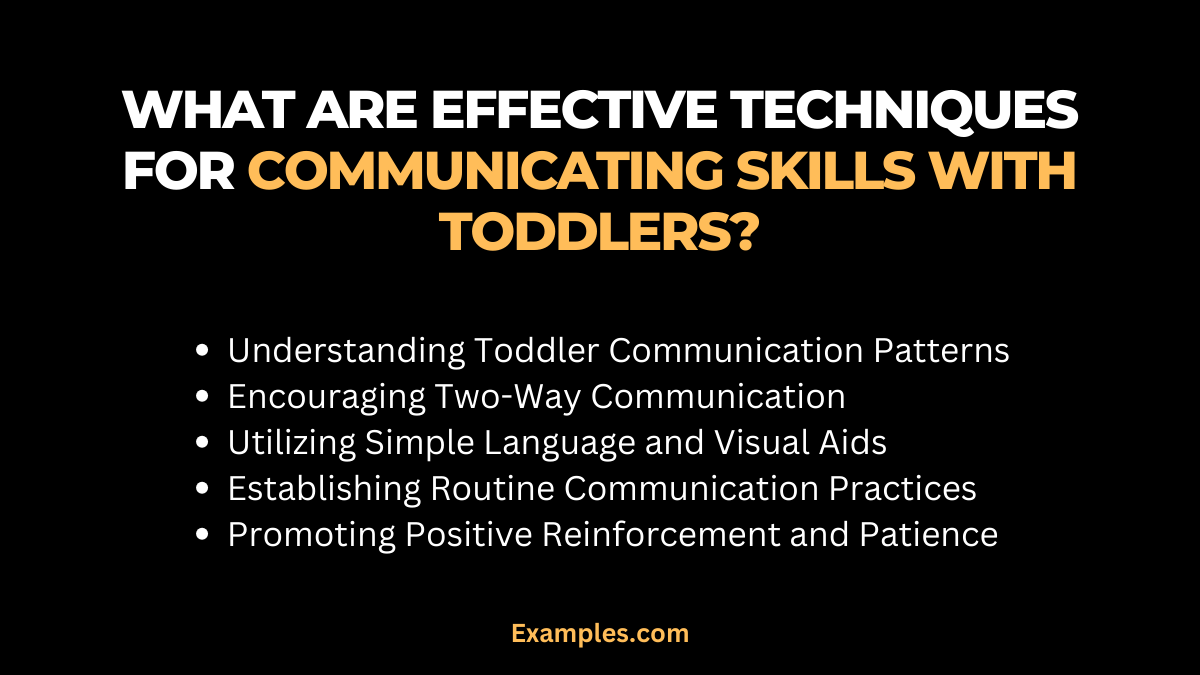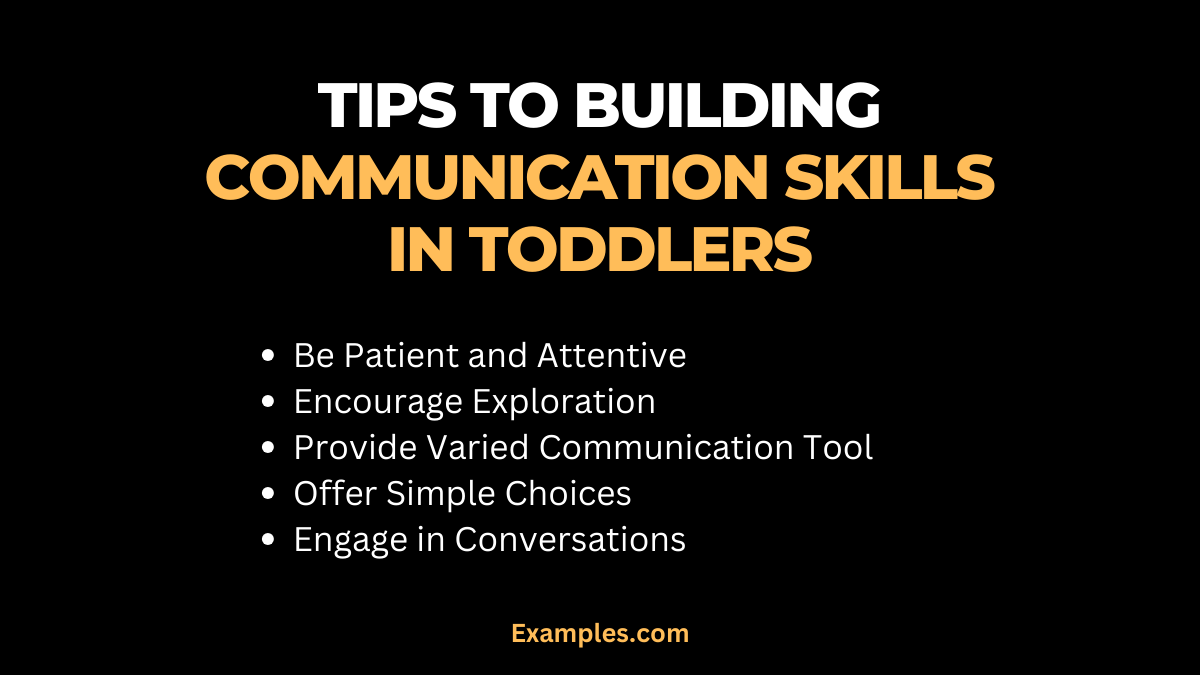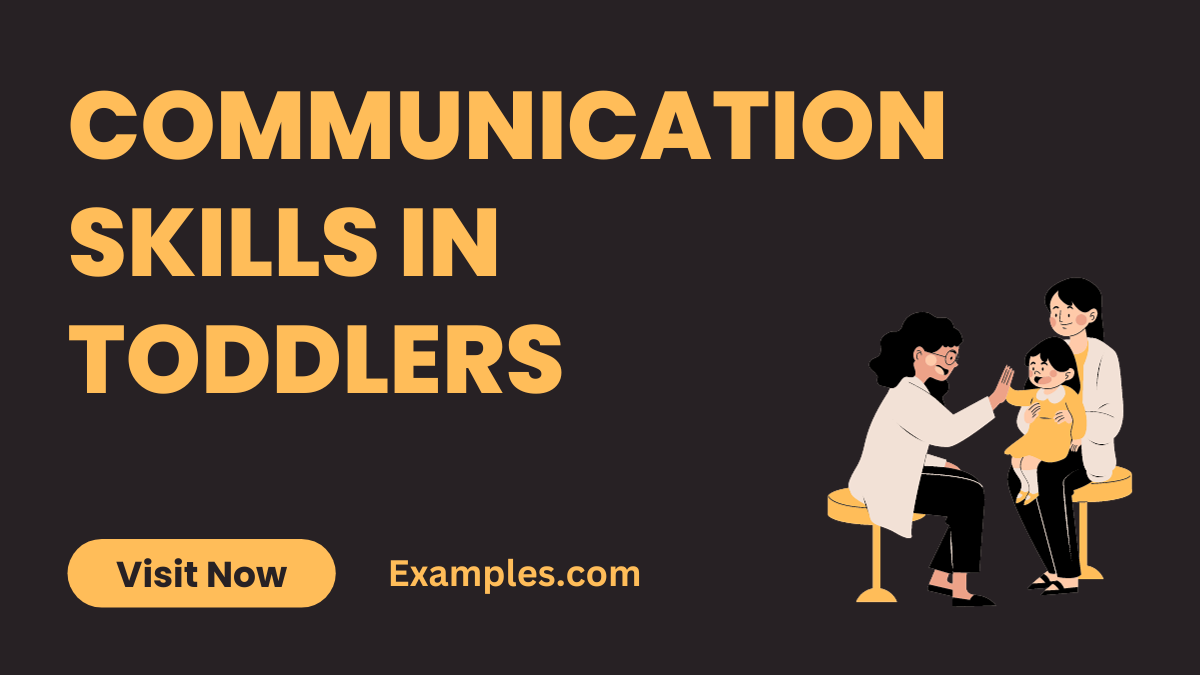29+ Communication Skills in Toddlers Examples
Delve into the exciting journey of nurturing communication skills in toddlers is both rewarding and essential for their development. In this comprehensive guide, we delve into the intricacies of fostering effective communication in the early years. Unlock the power of meaningful interactions through a plethora of engaging communication examples, tailored to enhance your toddler’s expressive abilities. Discover practical insights and proven methods that make communication a joyful and enriching experience for both you and your little one.
What are Communication Skills in Toddlers?

Communication skills in toddlers encompass their ability to convey thoughts, needs, and emotions effectively. Early language development is a key aspect, involving both verbal and non-verbal forms of expression. Through gestures, facial expressions, and attempts at speech, toddlers begin building a foundation for future communication. Encouraging and recognizing these early attempts fosters a strong communicative bond, promoting not only language proficiency but also social and cognitive development. Understanding and nurturing these skills contribute significantly to a toddler’s holistic growth.
30 Communication Skills in Toddlers Examples
Embark on a transformative journey with our comprehensive guide on communication skills in toddlers, featuring 30 dynamic examples. Nurturing your toddler’s expressive abilities is a joyful exploration, encompassing gestures, storytelling, and imaginative play. From naming objects to exploring opposites, these activities foster language development and creativity. Dive into this resource to discover engaging ways to enrich your toddler’s communication skills, creating lasting connections through language, play, and shared experiences.
- Gestures Speak Louder Encourage non-verbal cues like waving or pointing to express needs.
- Simple Commands Matter Teach toddlers to follow basic instructions, enhancing their comprehension.
- Imitate Sounds Playfully Engage in mimicking games to develop early vocal skills.
- Expressive Facial Expressions Encourage toddlers to mirror emotions through facial expressions.
- Interactive Storytelling Make storytelling interactive, fostering language development.
- Ask Open-ended Questions Encourage communication by posing questions that require more than a yes or no answer.
- Name Object Recognition Stimulate vocabulary by naming objects during play or daily activities.
- Role Play Fun Engage in imaginative play to boost communication and creativity.
- Turn-Taking Conversations Teach the concept of taking turns in a conversation, promoting reciprocity.
- Use of Simple Phrases Encourage toddlers to express themselves using short and simple phrases.
- Encourage Praise Instill positive reinforcement by praising their efforts in communication.
- Explore Nature’s Vocabulary Introduce words related to nature during outdoor activities.
- Use of Action Words Incorporate action words into play, enhancing their language skills.
- Identify Body Parts Teach body parts through games, connecting words to physical features.
- Expressing Emotions Encourage toddlers to verbalize their feelings, fostering emotional intelligence.
- Sing-Along Sessions Engage in singing to enhance rhythm and language skills.
- Name that Color Incorporate color names during play, promoting color recognition and language.
- Counting Together Count objects together, incorporating numbers into daily conversations.
- Encourage Imaginary Play Foster creativity and language through imaginative scenarios.
- Practice Gratitude Introduce words of gratitude, teaching appreciation and polite communication.
- Building Sentences Gradually encourage toddlers to construct simple sentences.
- Talk about Daily Activities Discuss daily routines to familiarize toddlers with routine-related words.
- Use of Descriptive Words Encourage toddlers to describe objects or experiences with detail.
- Explore Opposites Introduce opposite words during play, promoting understanding.
- Identify Shapes Incorporate shape names into play, enhancing shape recognition.
- Explore Texture Vocabulary Describe textures during sensory play, expanding their descriptive vocabulary.
- Animal Sounds Game Engage in identifying and imitating animal sounds.
- Discuss Weather Incorporate weather-related words during daily observations.
- Share Personal Experiences Encourage toddlers to share their day or experiences.
- Family Member Naming Foster familial bonds by naming and discussing family members.
What are the Effective Techniques for Communicating with Toddlers?

Discovering effective techniques for communicating with toddlers is key to fostering strong connections. Employing simple language, maintaining eye contact, and responding to their cues create a supportive environment. Engage in interactive play, encouraging toddlers to express themselves through gestures and words. Demonstrating patience and active listening enhances understanding. These techniques not only nurture language development but also strengthen the bond between caregivers and toddlers. Elevate your communication skills with these practical and enriching approaches.
1. Understanding Toddler Communication Patterns
Toddlers express themselves differently; decoding their cues, gestures, and early attempts at speech is crucial. Observing and responding to their non-verbal signals lays the foundation for effective communication.
2. Encouraging Two-Way Communication
Foster a dialogue with your toddler by encouraging interaction. Create an environment where they feel comfortable expressing their needs and thoughts, promoting a healthy exchange between caregiver and child.
3. Utilizing Simple Language and Visual Aids
Effective communication involves using age-appropriate vocabulary and incorporating visual aids. Simple language paired with images or gestures enhances understanding, making communication more accessible for toddlers.
4. Establishing Routine Communication Practices
Incorporate consistent communication practices into daily routines. Regular interactions during activities like meals or playtime create predictable moments for communication, contributing to language development.
5. Promoting Positive Reinforcement and Patience
Reinforce positive communication behaviors by offering encouragement and praise. Patience is key; allowing toddlers the time to express themselves fosters a supportive environment that nurtures their budding communication skills.
Why Building Communication Skills in Toddlers Is Important?
The significance of nurturing communication skills in toddlers extends beyond simple interaction.
Cognitive Development
Social Interaction and Emotional Expression
Effective communication is the cornerstone of successful social interaction. Toddlers who master communication skills exhibit improved emotional expression and stronger connections with peers and caregivers.
Preparation for Academic Success
A strong foundation in communication sets the stage for academic achievement. Toddlers with well-developed communication skills excel in language-related activities and are better equipped for future educational challenges.
Conflict Resolution and Self-Advocacy
Teaching toddlers effective communication provides them with tools for conflict resolution and self-advocacy. These skills contribute to their ability to navigate social situations and build resilience.
Building Parent-Child Bonds
Effective communication fosters a secure and trusting relationship between parents and toddlers. It creates a bond where mutual understanding and emotional connection flourish, strengthening the foundation for healthy parent-child dynamics.
How to Develop Communication Skills in Toddlers?
Ensuring effective communication development in toddlers involves intentional and playful strategies.
Encourage Interactive Play
Engage in activities that prompt communication, such as playing with toys or reading interactive books. This not only builds vocabulary but also fosters social interaction.
Model Clear Communication
Toddlers learn by imitation. Demonstrate proper communication by expressing feelings and thoughts clearly. This helps them understand the importance of effective expression.
Create a Language-Rich Environment
Surround your toddler with language-rich experiences. Describe daily activities, name objects, and encourage them to ask questions. Exposure to varied vocabulary enhances language skills.
Use Visual Aids
Incorporate visuals like pictures and flashcards to reinforce language concepts. This helps toddlers associate words with images, aiding in comprehension and retention.
Celebrate Milestones
Acknowledge and celebrate each communication milestone, whether it’s a new word or an attempt at forming sentences. Positive reinforcement motivates continued language development.
Tips to Building Communication Skills in Toddlers

Building communication skills in toddlers requires a thoughtful approach that considers their developmental stage.
Be Patient and Attentive
Allow toddlers the time to express themselves. Listen attentively, maintaining eye contact and showing genuine interest. Patience encourages them to communicate comfortably.
Encourage Exploration
Create an environment that stimulates curiosity. Offer opportunities for toddlers to explore and communicate about their surroundings. This enhances both language and cognitive skills.
Provide Varied Communication Tool
Introduce diverse communication tools, from books to interactive apps. Offering a range of resources caters to different learning styles, ensuring effective skill development.
Offer Simple Choices
Presenting toddlers with choices encourages them to communicate preferences. Whether it’s selecting a snack or choosing a toy, decision-making fosters language expression.
Engage in Conversations
Initiate simple conversations with toddlers. Ask open-ended questions and respond to their attempts at communication. This reciprocal interaction strengthens language skills and builds confidence.
In wrapping up our exploration of communication skills in toddlers, it’s evident that fostering effective communication in the early years is a transformative journey. By implementing the diverse array of techniques provided, parents and caregivers can create a language-rich environment that nurtures not only linguistic abilities but also strengthens the emotional bond with their toddlers. This holistic approach ensures a foundation for lifelong communication success.
As we continue to strive for excellence in nurturing our little ones, consider exploring additional insights from authoritative sources. The American Academy of Pediatrics offers valuable guidance on child development, including communication milestones and strategies. For a deeper understanding of language acquisition in toddlers, the Harvard Center on the Developing Child provides research-backed insights. These trusted resources complement our journey in enhancing toddler communication skills, promoting a harmonious and enriching developmental experience.



